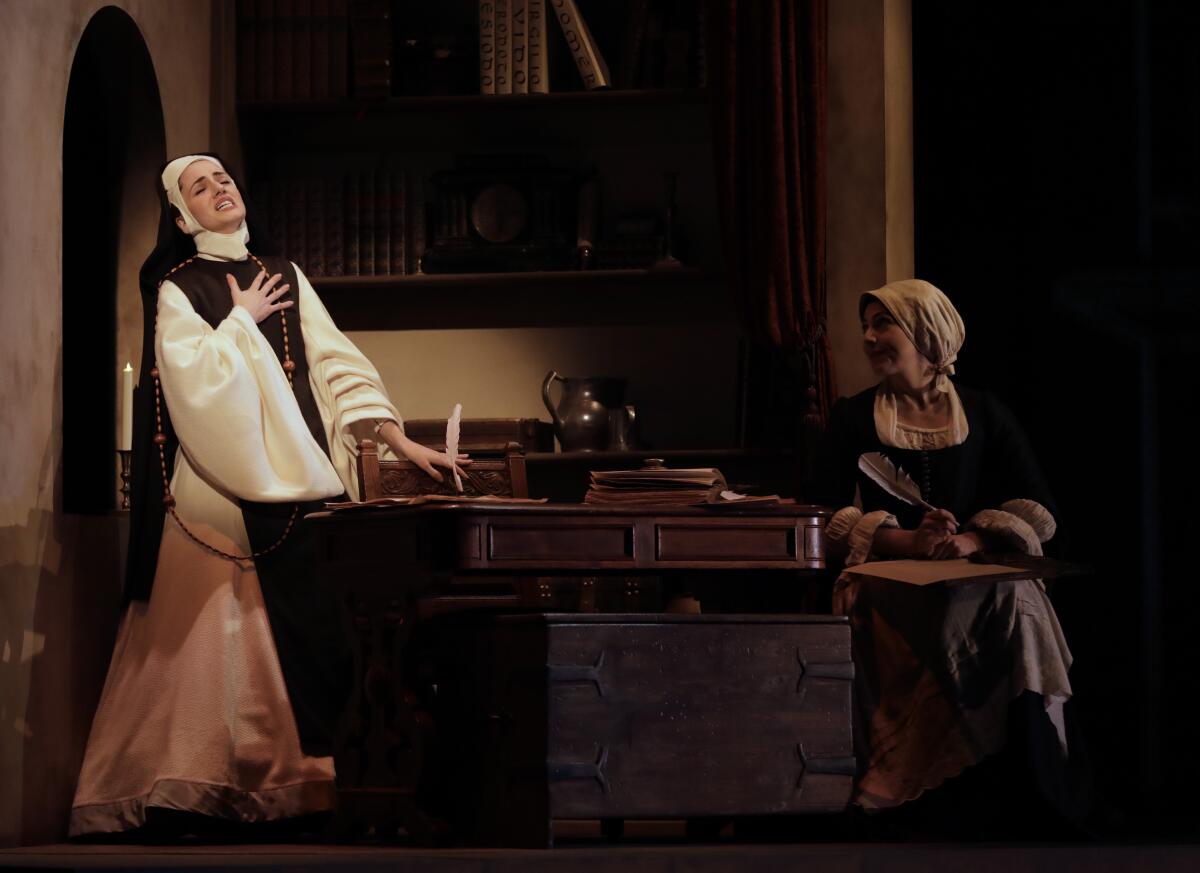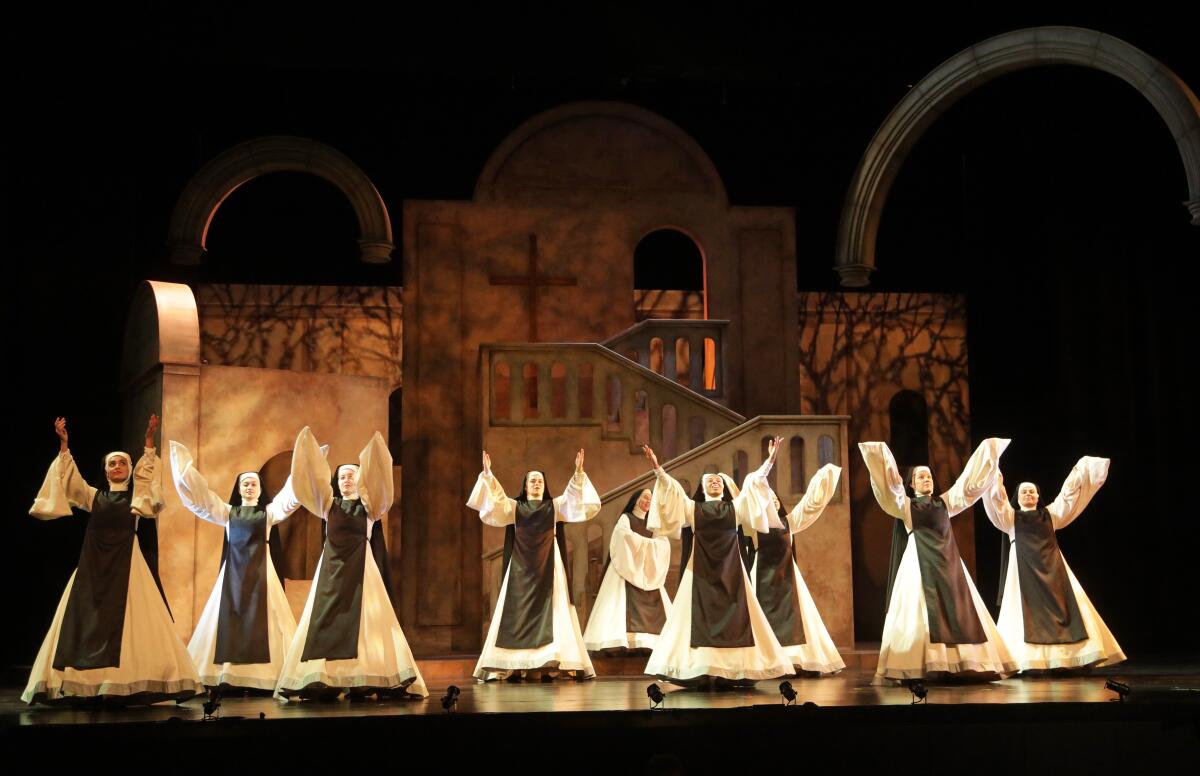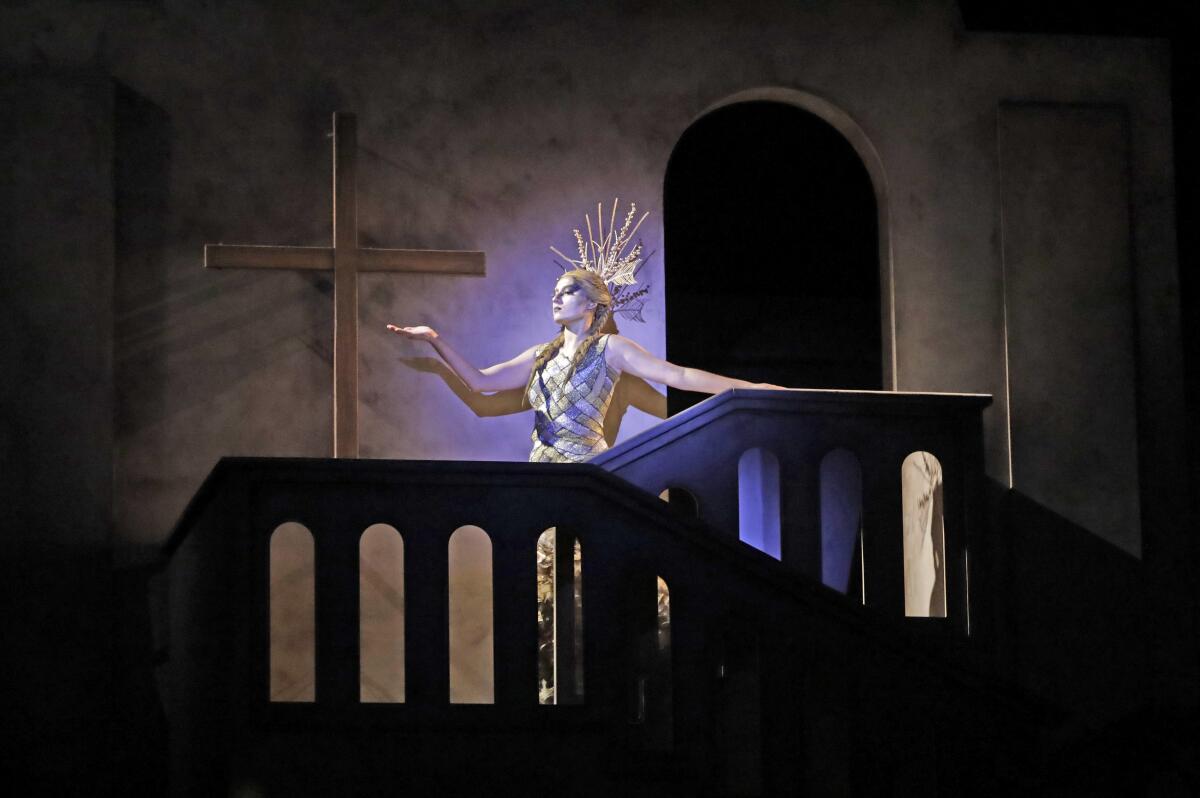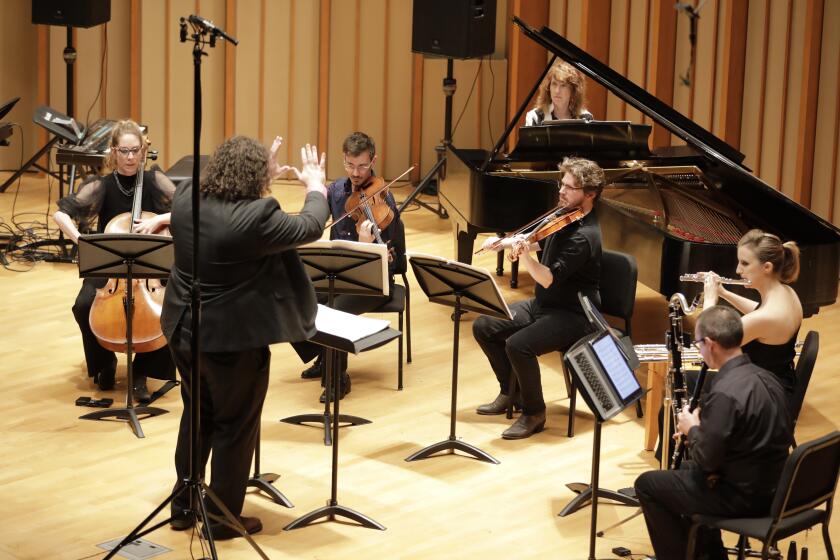First a Netflix series, now an opera, ‘Juana.’ Why the story of a 17th century nun sings

- Share via
Long before Frida there was Juana.
Sor Juana Inés de la Cruz, a nun in 17th century Mexico City, then capital of New Spain, was the first great poet in the Americas. She was also a determined scholar, composer, playwright, painter, architect and religious thinker at a time when women, and especially nuns, weren’t supposed to be any of those things. In so doing with unerring brilliance, she managed to became one of the most celebrated figures of her time in the Spanish world.
She may not have a fraction of the international fame of Frida Kahlo. The cloister in which Juana lived in Mexico City’s historic center may not draw the clusters of tour buses that Frida’s house does. Sor Juana fell into relative obscurity for close to three centuries, until Nobel laureate Octavio Paz published a pioneering biography and study of her. Since then, a valuable Juana cultural industry has taken hold.
Her likeness is on Mexico’s 200 peso note. Modern Juana novels, plays and films abound. Netflix offers the binge-worthy biopic series “Juana Inés,” enhanced by Michael Nyman’s music. John Adams included her poems in his popular oratorio “El Niño.” Five years ago, Fort Worth Opera mounted Daniel Crozier’s “With Blood, With Ink” about her.
With the premiere of Carla Lucero’s illuminating “Juana” at the Freud Playhouse on Friday night, Opera UCLA has brought Juana once more to the lyric stage. Based on the 1999 novel “Sor Juana’s Second Dream” by UCLA scholar Alicia Gaspar de Alba, who cowrote the Spanish language libretto with the composer, the new opera posits a Juana for our times.
As an operatic heroine, the illegitimate daughter of a Spanish officer and Creole mother is a natural both for what we know about her and for all that we can, as is the need and right of opera, surmise. Her precocious genius stunned priests and scholars alike in Mexico City, as did her entrancing beauty. She had a feisty independence yet became a nun at age 19. Presumably, this was a way for her to avoid a stifling marriage and to pursue her scholarly and artistic aims. It is now widely held, and is the central theme of the opera, that Juana was not only a proto-feminist but also a gay one.
She remarkably thrived as a poet and scholar in religious life but bristled under its restrictions. She had adversaries around every corner, be it misogynist male clergy or scheming nuns jealous of her fame and privilege.

The opera opens with Juana having been commissioned, to the disapproval of her mother superior and of her confessor, to design a grand arch for the arrival of a new viceroy and his wife, the vicereine, from Spain. By reading not very far between the sensual lines of Juana’s poetry and her correspondence with the vicereine (La Contessa in the opera), De Alba posits in her novel a romance, which is consummated at the end of the first act.
Juana’s bold liturgical arguments ultimately led to her downfall. She repented and signed her repentance in blood. The opera’s Inquisition-like trial, in which she is forced to give up her books and serve the sick, is the dramatic climax, presenting Juana as an ecstatic martyr, shocking her tormentors. Within months, she catches what might have been plague and dies at age 46 in 1695.
Opera UCLA is presenting “Juana” as the second of three new operas by female composers and librettists, begun last spring and continuing to next spring. The production, a collaboration with UCLA’s Herb Alpert School of Music and its School of Theater, Film and Television, is a nearly all-female affair, with the occasional male student mostly in technical capacities. The cast, of course, has its share of male singers for clergy and court roles, each a duplicitous or otherwise ineffectual character. If that sounds ungenerous, in real life, some were seemingly far worse. Juana’s nemesis, a loathsome archbishop, flogged priests for allowing a woman to come anywhere near them or to have even cleaned a floor on which they walked.
For Lucero, “Juana” is a labor of love. She already had wanted her second opera (her first, “Wuornos,” portrayed serial killer Aileen Wuornos) to be about Sor Juana when she discovered De Alba’s novel in 2002. The project has been a 17-year effort, with interruptions for other work. The score offers an occasion for the Bay Area composer to incorporate what might seem contradictory strengths: a background in the avant-garde at the California Institute of the Arts, work in television and film, along with — as a Latina herself — an abiding interest in indigenous Mexican music.
The result is a loving portrait of Juana and her inner struggles with sexuality and liberation. In contrast to the somewhat more modernist male gaze of Crozier’s “With Blood, With Ink,” Lucero’s vocal writing is highly lyrical. It is a longish two-act opera (nearly three hours with intermission, double the length of Crozier’s) that, though divided into a great many short scenes, feels like it flows musically with few breaks.
The chamber orchestra, conducted by Mary Chun, is one of the opera’s two great glories. Along with a standard string quintet, the ensemble is peppered with Baroque instruments (harpsichord, alto recorder and small guitar) and colored by indigenous percussion instruments and ocarina. A modern guitar adds some Spanish flair.
Lucero comfortably mixes these musical periods and styles. But there is no way to keep the indigenous instruments with their sounds and tunings down, bringing to mind speculations about a lost Juana treatise on tunings. (John Cage and Paz happened to have been fascinated by this prospect and once discussed it over breakfast at Harvard.) I heard the ocarina as the voice of Juana standing out from the crowd.
The other glory was Meagan Martin’s Juana. A mezzo-soprano who recently graduated from UCLA, she offered a calmly possessed poet of subdued sublimity, a figure of near saintly grace in the various political, social and church snake pits she is subjected to. She suggested little of the fleshy, flashy sensuality of La Contessa, intended for a showier soprano and here expertly handled by Michelle Drever. The sublimity of their love scene is gracefully suggested through the orchestra and whispered poetry, rather than intertwining vocal lines.

The one oddity to the sizable cast of historical figures, capably sung by student performers, is the addition of El Alma, a spectral, maybe Maya, figure who spells out what the opera is all about. She (or he, or they — the role was written for an androgynous countertenor but is here taken by a mezzo-soprano) references Plato’s proposition of three sexes in “Symposium” and prepares us for Juana as a Sapphic figure returning to help us with interpretive perspective.
Thanks to the commanding vocal and theatrical presence of Carmen Voskuhl, dressed in a slinky gown and extravagant headdresses, El Alma might seem a welcome exotic presence in an otherwise straightforward period production directed by Sara E. Widzer. But the Juana we celebrate challenged academic orthodoxy, as the rest of “Juana” convincingly demonstrates.
Set aside the L.A. Phil for a moment. Ellen Reid, Vicki Ray, Shalini Vijayan and Andrew McIntosh prove how the city is much more than one orchestra.
More to Read
The biggest entertainment stories
Get our big stories about Hollywood, film, television, music, arts, culture and more right in your inbox as soon as they publish.
You may occasionally receive promotional content from the Los Angeles Times.












